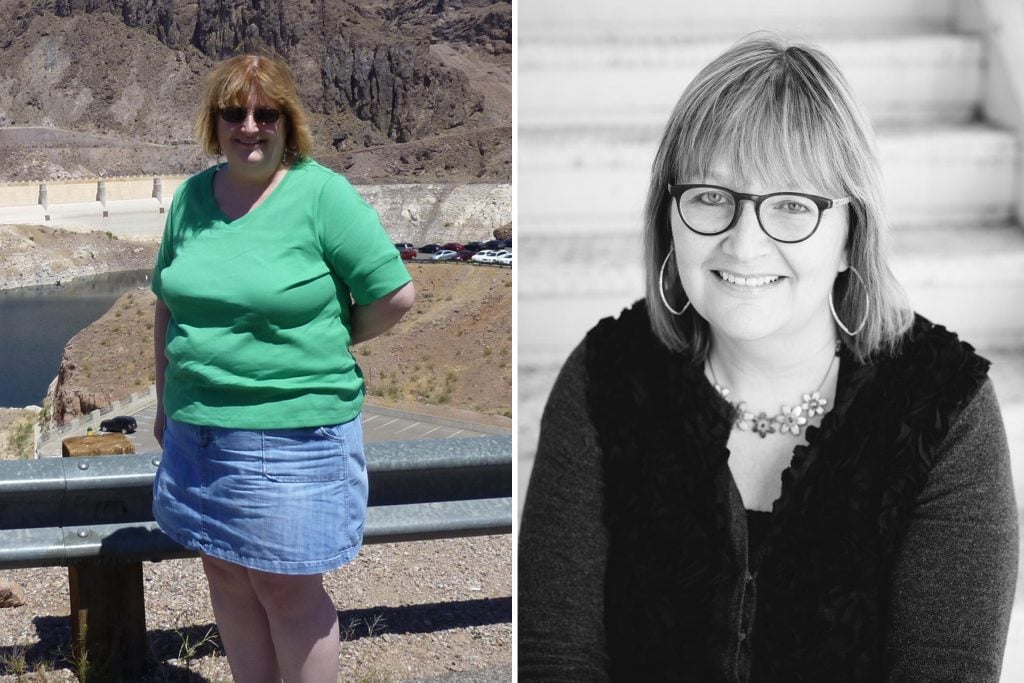
The massive, wrinkled fat rolls pictured on the Facebook post repulsed me. I blinked hard before I noticed the middle-aged women who had flashed their abdomens for the camera were smiling. And then I saw it—the “fat happens” mantra beneath the photo. This is the exact age it becomes harder to lose weight.
My immediate thought was to delete the post. As I kept studying the picture, though, I decided I had to respond. I couldn’t post anything—not even an “LOL”—that might signal agreement with the sentiment, even though a dear friend had shared it. As a former chair-busting 40-something, I knew karma would punish me if I didn’t speak out.
“It doesn’t have to be that way,” I typed, noticing my left hand tremble just a bit as I pecked out the letters. Candidly, it was difficult to write even that. But those words had changed my life, prompting me to start a journey that led to losing 100 pounds. I hoped at least they’d give others pause.
After I lost the weight, I promised myself I’d never again support the belief that middle-aged women—and men—are destined to grow fat, lose muscle tone, and develop heart disease. I just couldn’t propagate that falsehood once I knew differently.
I was never a fat kid. I ate right, I was active, and I just had fun. But that all stopped after college as I walked the tightrope of my stressful career. Food was my escape. Sure, I tried to lose weight through the years. After dozens of half-hearted, failed efforts—name a diet and I tried it—I gave up. I told everyone I would always be fat. I couldn’t change.
I believed that until my husband and I, joined by two of our closest friends, took a cruise to the Caribbean to celebrate my 50th birthday. I was having incredible knee pain—that tends to happen when you weigh almost 250 pounds—and could hardly hobble around our cabin. Still I agreed to go on a shore excursion around one of the islands.
My knee threatened to give out several times as I slowly walked out of the cabin, around the stairways, and down the gangplank to the van. After hoisting myself into the van and taking a seat, I watched as a massively obese woman (even compared to me!), slowly climbed aboard. Everyone pretended not to notice the woman’s face, scrunched in pain, as she slowly shuffled to her seat.
“Ah, a glimpse into my future,” I jokingly whispered to my friend Sherry.
“No, it’s not,” my friend said in a dead-serious whisper. “It doesn’t have to be that way. You can diet. You can exercise. You can change.”
That simple statement triggered something in me. I started to think about my life and how I’d gone from semi-athletic kid to queen-size pantyhose wearer who could hardly walk a few hundred feet. And how my mom—who didn’t have the internet or DVD workout programs or any of the other more modern conveniences we have now—kept weight gain at bay.
Content continues below ad
Modern weight-loss systems weren’t working. Why not give the tried-and-true method a chance? Don’t miss the 50 things your doctor wishes you knew about losing weight.
These are the lessons I learned in my mission to lose 100 pounds:
- You can’t buy weight loss. Yes, there are plenty of high-priced diets and workouts available. Unless you are committed to losing weight, though, no pricey systems will do a shred of good.
- Calories count. Count them. When I began my serious weight-loss journey, I used (and still use) the free tracking system SparkPeople. Yes, it takes time to track food, but the accountability you gain is well worth the time and money.
- Think ahead. If I knew I was going to dine out, which I rarely did, I would pre-plan my meal. Then I could put the calories into my tracker ahead of time. Pre-planning let me know exactly how much I could eat the rest of the day so as not to exceed my calorie limit.
- Network. SparkPeople has a recipe database and forums where members share ideas. I credit those forums with introducing me to healthier versions of recipes I enjoyed (chicken fingers, tuna casserole). The quality of your food calories count, and this program helped me eat healthy, appealing foods. Another bonus: The other members gave me words of encouragement when I didn’t lose weight or, sadly, gained weight. Their words meant a lot, because they understood.
- Set aside time to exercise. You don’t need to join a gym or buy expensive equipment. You do need to set aside the time to move and commit to moving during that time. Yes, you’re busy. We all are. But how much is your health worth? I started moving by thinking about what I liked to do as a kid—swimming. So I joined a community gym and began swimming. I branched out to other exercises from there. One of my favorites is “walking workouts” by fitness guru Leslie Sansone. There are plenty of other at-home exercises that work well too.
- Choose to move. Remember: All movement counts toward fitness and weight loss, even housework and laundry. Set a timer to remind yourself to move at least once an hour—no, you won’t remember. A timer can help build the habit.
Now that you’ve heard about Nancy’s journey, it’s time to start your own. Make changes to your lifestyle with these 50 ways to lose weight without a lick of exercise.
The post How One Woman Lost 100 Pounds at 51—and Kept It Off appeared first on Reader's Digest.
from Diet & Weight Loss – Reader's Digest http://ift.tt/2EWpsjo
No comments:
Post a Comment